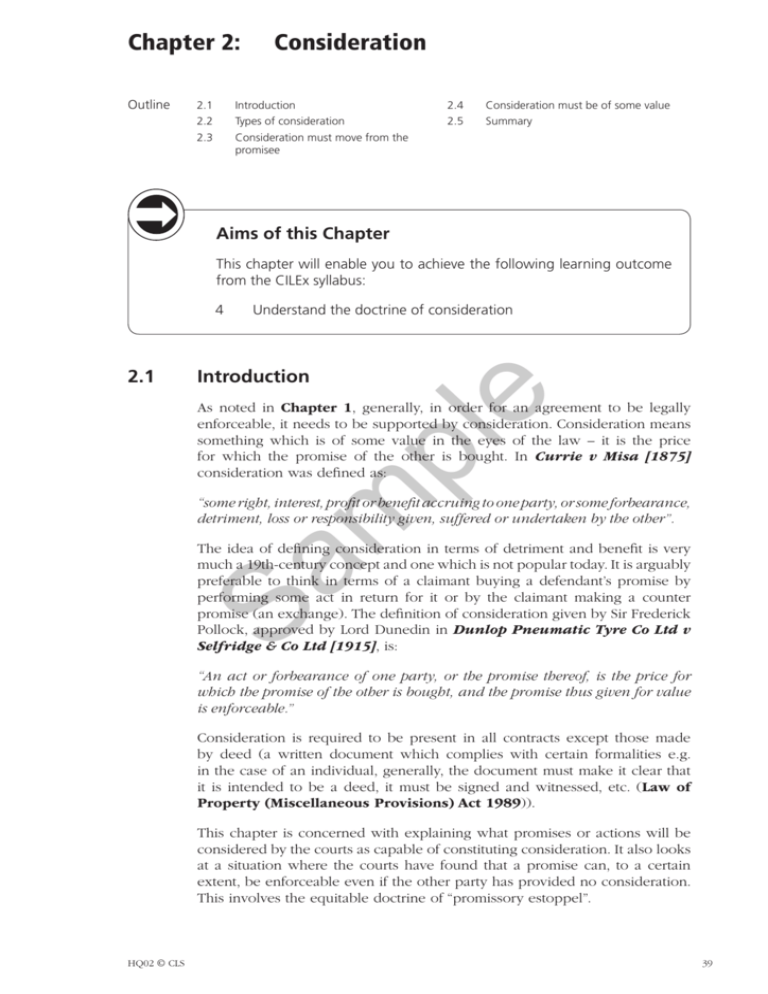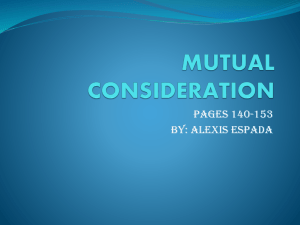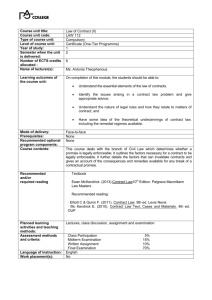
Chapter 2:
Outline
Consideration
2.1
Introduction
2.4
Consideration must be of some value
2.2
Types of consideration
2.5
Summary
2.3
Consideration must move from the
promisee
Aims of this Chapter
This chapter will enable you to achieve the following learning outcome
from the CILEx syllabus:
4
Introduction
e
2.1
Understand the doctrine of consideration
Sa
m
pl
As noted in Chapter 1, generally, in order for an agreement to be legally
enforceable, it needs to be supported by consideration. Consideration means
something which is of some value in the eyes of the law – it is the price
for which the promise of the other is bought. In Currie v Misa [1875]
consideration was defined as:
“some right, interest, profit or benefit accruing to one party, or some forbearance,
detriment, loss or responsibility given, suffered or undertaken by the other”.
The idea of defining consideration in terms of detriment and benefit is very
much a 19th-century concept and one which is not popular today. It is arguably
preferable to think in terms of a claimant buying a defendant’s promise by
performing some act in return for it or by the claimant making a counter
promise (an exchange). The definition of consideration given by Sir Frederick
Pollock, approved by Lord Dunedin in Dunlop Pneumatic Tyre Co Ltd v
Selfridge & Co Ltd [1915], is:
“An act or forbearance of one party, or the promise thereof, is the price for
which the promise of the other is bought, and the promise thus given for value
is enforceable.”
Consideration is required to be present in all contracts except those made
by deed (a written document which complies with certain formalities e.g.
in the case of an individual, generally, the document must make it clear that
it is intended to be a deed, it must be signed and witnessed, etc. (Law of
Property (Miscellaneous Provisions) Act 1989)).
This chapter is concerned with explaining what promises or actions will be
considered by the courts as capable of constituting consideration. It also looks
at a situation where the courts have found that a promise can, to a certain
extent, be enforceable even if the other party has provided no consideration.
This involves the equitable doctrine of “promissory estoppel”.
HQ02 © CLS
39
2.2
Consideration
2.2
Types of consideration
There are two valid types of consideration: executed and executory.
This reflects the two different ways in which a claimant may purchase the
defendant’s promise.
Executory consideration consists of a promise made in return for a promise
– where both promises are still to be performed – such as a contract between
a buyer and seller for the future delivery of a car on credit.
Executed consideration occurs when one of the two parties has done
all that he is required to do, leaving any outstanding liability on the other
party, for example, where there is a promise of a reward if lost property
is returned. If the property is returned by B to A, then B has fulfilled his
part of the contract. He is said to have executed his consideration, whilst A’s
consideration, payment of the reward, is still outstanding.
Sa
m
pl
e
What happens if the promise (the alleged consideration) is given after the act
has been completed? In English law this is treated as “past consideration”
and the general rule is that past consideration is no consideration at all. In
cases involving executed and executory consideration the claimant, in order
to succeed in any claim, must prove that his act or promise was given in
exchange for the defendant’s promise. If the defendant made the promise
afterwards, it can be regarded only as an expression of gratitude (i.e. a gift)
and thus not a binding contract. It is important to understand that the term
“past” here means past in relation to the making of the promise that the
claimant is seeking to enforce, not past in relation to the time at which the
claimant is seeking to enforce the promise. For example, X offers Y £25 for
giving him a lift to an airport. Here, Y can claim the £25 only if he does, in
fact, take X to the airport – Y’s consideration is then executed (i.e. given in
return for the promise, since it is carried out after the promise). On the other
hand, if Y, knowing that X is in need of a lift to the airport, volunteers his
services and, having been transported to the airport, X promises to give Y
£25 for his trouble and effort, Y’s consideration here is past in relation to the
making of the promise by X. Y would not be able to enforce X’s promise since
his act of taking X to the airport was done before X’s promise was made.
Two classic cases illustrate the principle. In Roscorla v Thomas [1842] there
was a declaration that “in consideration that the claimant at the request of the
defendant had bought of the defendant a certain horse . . . for a certain price,
the defendant promised the claimant that the said horse was sound and free
from vice”. It transpired that the horse was extremely vicious and the claimant
sued for breach of the promise. It was held that his claim must fail since the
express promise was made after the sale and was therefore unsupported by
consideration.
In the second case, Re McArdle [1951], a number of children were entitled
by virtue of their father’s will to a house once their mother had died. During
the mother’s lifetime one of the children and his wife lived with her in the
house. During this period the wife made various improvements and alterations
to the house. On the mother’s death the other children signed a document
stating that the executors should pay her £488, the cost of the improvements.
40
HQ02 © CLS
Consideration
2.2
The executors, in fact, failed to pay and the wife sued. It was held that the
carrying out of the improvements was past in relation to the promise to pay
her the £488, so her action failed.
2.2.1
The principle in Lampleigh v Brathwait
Exception
pl
e
If a person asks another to provide certain services, it is implicit in the request
that the services will be paid for. Thus, if Tom asks Bill if the latter will
clean his windows, it is clear that, by implication, Tom is expecting to pay
Bill when the windows have been cleaned. This is so, even if no price has
been mentioned. This is an exception to the rule that past consideration is
no consideration. Although payment comes after the performance of the act
(cleaning the windows in the above example) the fact that the work was
requested makes it a completely different situation from, for example, Re
McArdle above. What if a price was not agreed between the two parties
for the act requested? The answer is that a reasonable price must be paid
in relation to any goods supplied (s8(2) Sale of Goods Act 1979) and a
reasonable charge paid for any service rendered (s15 Supply of Goods
and Services Act 1982). What is reasonable is to be determined by the
circumstances of the case, but in general means that the market rate for the
goods or services must be paid.
Sa
m
It is clearly common sense that if you ask someone to do some work for you,
that person will expect to be paid when the work is completed. The fact that
this is common sense shows in the fact that this was held to be the law as
long ago as 1615 in Lampleigh v Brathwait [1615]. In this case Brathwait
asked Lampleigh to get him a pardon from the King after he had committed
a murder. Lampleigh succeeded in obtaining the pardon and Brathwait in
gratitude promised to pay him £100, which he then failed to pay. Lampleigh
sued but was met with the defence that his consideration was in the past
when the promise to pay the £100 was made. The court nevertheless gave
judgment to Lampleigh on the basis that the previous request, in fact, implied
that there would be some reward for Lampleigh should he obtain the King’s
pardon and that the request and the subsequent promise should be treated as
part of the same transaction.
The principle in Lampleigh v Brathwait was restated in Pao On v Lau Yiu
Long [1980] in which Lord Scarman stated: “The [past] act must have been
done at the promisor’s request; the parties must have understood that the [past]
act was to be remunerated either by a payment or the conferment of some other
benefit; and payment, or the conferment of a benefit, must have been legally
enforceable had it been promised in advance.”
Lord Scarman’s reference to an understanding that the past act “was to be
remunerated” is drawn from Re Casey’s Patents [1892]. The claimant had
managed the royalties for some patents owned by the defendants. They then
promised him a one-third share in return for the work he had done. It was
held that there must have always been an expectation that the claimant would
be recompensed for the work he was doing. The promise of the one-third
share simply gave specific form to that implied promise.
HQ02 © CLS
41
2.2.1
Consideration
Statutory exceptions
Other exceptions to the rule of past consideration being no consideration
exist in statute (s29(5) Limitation Act 1980 and s27 Bills of Exchange
Act 1882).
2.3
Consideration must move from the promisee
English contract law has traditionally required that consideration moves from
the promisee, though this rule has now been affected by the Contracts (Rights
of Third Parties) Act 1999 (C(RTP)A 1999), discussed in Chapter 9.
pl
e
Where the traditional rule applies, a person to whom a promise has been
made can enforce it only if he himself has provided consideration for it. For
example, if A promises to wash B’s car if B promises to pay C £10, then if
A does, in fact, wash the car and B subsequently fails to pay the £10 to C,
C cannot enforce the contract against B since he (C) has not furnished any
consideration. It may, of course, be possible for A to enforce the promise
against B. The rule is really a corollary of the rule that only the parties to a
contract can sue on the contract (the rule of privity of contract), since, if a
person furnishes no consideration, he takes no part in the bargain and if he
takes no part in the bargain, he takes no part in the contract.
Sa
m
An illustration of the rule may be seen in Tweddle v Atkinson [1861] where
the partners’ fathers each agreed to pay a sum of money to the new husband
after a marriage and agreed between themselves that the husband would have
a right of action to sue should either parent fail to pay. The wife’s father died
before he could make the payment and his executors refused to pay. The
husband sued the executors. It was held that his action must fail, because he
had furnished no consideration under the agreement.
It should be noted that whilst the consideration must move from the promisee,
it need not move to the promisor. The promisee may suffer some detriment
at the request of the promisor which may confer no benefit on the promisor,
for example, giving up a job.
As noted above, C(RTP)A 1999 now provides that where A and B make a
contract with the intention that C shall have an enforceable right under it, C
may be able to enforce this right. This is discussed in more detail in Chapter
9.
2.4
Consideration must be of some value
The rule is that consideration must be sufficient but need not be adequate.
What this means is that the law requires the parties to have entered into a
bargain where each side has provided something of value that the courts can
see. The courts are not generally interested in whether this is the full market
value, or whether the contract is a fair bargain. That is for the parties to
negotiate for themselves. The term “sufficiency” describes something that the
courts can see of value that makes the bargain binding, whilst “adequacy” may
42
HQ02 © CLS
© 2014 Copyright CILEx Law School Limited
All materials included in this CLS publication are copyright protected.
All rights reserved.
Any unauthorised reproduction or transmission of any part of this
publication, whether electronically or otherwise, will constitute an
infringement of copyright. No part of this publication may be lent, resold
or hired out for any purpose without the prior written permission of
CILEx Law School Ltd.
e
WARNING: Any person carrying out an unauthorised act in relation
to this copyright work may be liable to both criminal prosecution
and a civil claim for damages.
pl
This publication is intended only for the purpose of private study. Its
contents were believed to be correct at the time of publication or any
date stated in any preface, whichever is the earlier.
Sa
m
This publication does not constitute any form of legal advice to any person
or organisation.
CILEx Law School Ltd will not be liable for any loss or damage of any
description caused by the reliance of any person on any part of the
contents of this publication.
Published in 2014 by:
CILEx Law School Ltd
College House
Manor Drive
Kempston
Bedford
United Kingdom
MK42 7AB
British Library Cataloguing in Publication Data
A catalogue record for this manual is available from the British Library.
ISBN 978-1-84256-754-8






